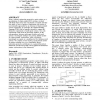666 search results - page 62 / 134 » Modeling Agents with a Theory of Mind |
AGENTS
2001
Springer
14 years 1 months ago
2001
Springer
From a software engineering perspective, agent systems are a specialization of object-oriented (OO) systems, in which individual objects have their own threads of control and thei...
TKDE
2010
13 years 7 months ago
2010
Abstract—The imperfect nature of context in Ambient Intelligence environments and the special characteristics of the entities that possess and share the available context informa...
CEEMAS
2005
Springer
14 years 2 months ago
2005
Springer
In the AOSE (Agent-Oriented Software Engineering) area, several research efforts are underway to develop appropriate meta-models for agent-oriented methodologies. Meta-models are ...
ATAL
2005
Springer
14 years 2 months ago
2005
Springer
In the design of resource bounded agents, high-level cognitive activities, such as reasoning, raise important problems related both to the adaptive ability and to the computationa...
AAAI
2008
13 years 11 months ago
2008
Modern Bayesian Network learning algorithms are timeefficient, scalable and produce high-quality models; these algorithms feature prominently in decision support model development...

